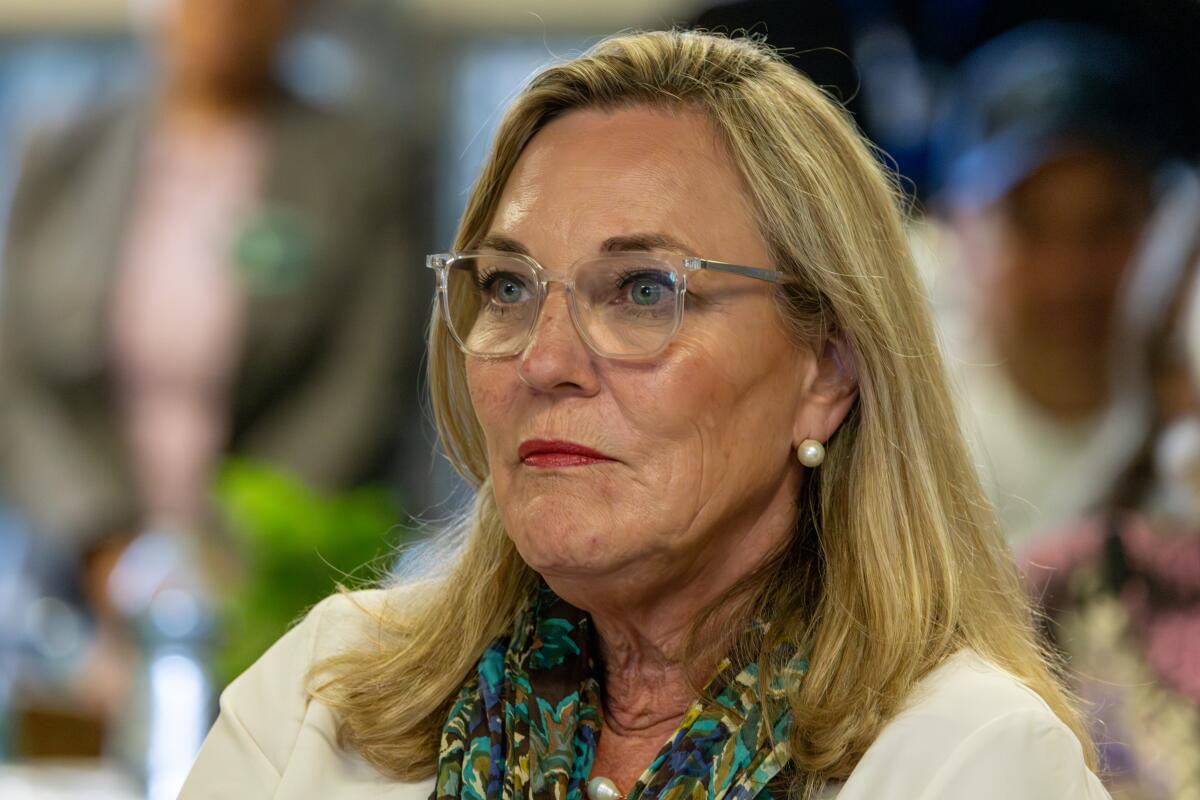Endorsement: Kathryn Barger has earned another term on the Board of Supervisors

- Share via
Los Angeles County’s 5th Supervisorial District seemed made for Kathryn Barger when she was first elected in 2016. It included the county’s most conservative swaths in the Antelope Valley and northern parts of the San Fernando, San Gabriel and Pomona valleys, where voters appreciated her fiscal conservatism and support for law enforcement.
Ongoing demographic and generational shifts steadily moved the electorate toward the political center. But Barger’s liberalism on social issues kept her relevant with voters. Low-profile Democratic opponents did poorly against her in that first race, and in her 2020 reelection.
While the presidential contest will garner the most attention in 2024, there are many important races and measures on state and local ballots.
Things are different now, as Barger seeks her third and final term on the board. The district still includes Santa Clarita and other conservative (for Los Angeles County) suburban bastions. But redistricting has given her much of the Hollywood Hills, where voters lean further to the left. Population centers in Pasadena, Glendale and Burbank have shed their Republican skin.
A candidate running with Democratic Party support in this nonpartisan district has a real shot, and Barger has serious challengers in the March primary: Democratic Assemblymember Chris Holden of Pasadena and Burbank Councilmember Konstantine Anthony, plus attorney and entrepreneur Perry Goldberg and Littlerock resident Marlon Marroquin.
Holden, especially, is a strong contender. But Barger remains the best choice, and The Times recommends her for reelection.
Term limits are forcing Los Angeles County Supervisor Michael D.
This may be the time when the county needs Barger most. The county enjoyed mostly good economic times over the last decade, notwithstanding pandemic shutdowns, as it correctly shifted away from incarceration and toward care for the sick, the homeless, the mentally ill and the addicted. But if the huge projected state budget deficit is any guide, the county may be facing a fiscal bump in the road. Or maybe even a major detour.
Barger, who served for decades on the staff of Supervisor Michael D. Antonovich before succeeding him on the board, has managed budget shortfalls in the past and can walk the line between overspending and panic cutting of services for the most vulnerable county residents. Her experience is her strength.
As the most centrist member of an otherwise progressive board, Barger often concurs with her colleagues’ policy decisions but provides a dose of political and fiscal reality. For example, she favors the urgently needed closure of the outdated and unsafe Men’s Central Jail, but rejects the board majority’s fantasy timeline for getting the job done. The county will have to create hundreds more mental health and substance use treatment beds before it will be able to close the jail, and the supervisors — including Barger — have to push harder to close the facility.
The decrepit lockup facility was to close today under Board of Supervisors’ two-year timeline, but it remains full with no end in sight.
At a recent interview with the Times editorial board, she mused that maybe the supervisors should order the jail demolished tomorrow, because that may be the only way to accelerate acquisition of the treatment beds. She was joking, we think, but more than her colleagues she has come to terms with how the county works and what motivates it to act. It responds to crisis, and often to little else.
Barger herself responded to crisis in the Antelope Valley, which for several years had several high-profile child deaths that arguably could have been prevented if child protective services were as fully staffed there as they are in the rest of the county. Barger quietly corrected the problem with more resources.
Her missteps are most often policy moves that might appeal to her district’s more conservative orientation. For example, although she professes to support “housing first,” which recognizes that it is difficult to treat a homeless person’s medical and mental health needs without first providing stable housing, she nominated Drew Pinsky — radio’s Dr. Drew — to the county’s homelessness commission in 2021. Pinsky, a former COVID denier, called the housing first model a hoax. Barger later withdrew the nomination.
If L.A. County supervisors are serious about their care-first approach to services, they will reject the nomination of Drew Pinsky, the COVID-denying, justice-reform-blaming media darling who stands for just about everything opposite of the reforms the board has put forward.
Holden chairs the Assembly’s powerful Appropriations Committee, so he knows his way around policy and budgets. In the end, though, his politics aren’t appreciably different from Barger’s, party affiliation notwithstanding, and he lacks her direct county government know-how.
Anthony has served capably in Burbank city government, but his three-year record of service on a part-time city council does not equip him to take on the job as full-time representative of 2 million constituents, many in desperate need of county services.
Goldberg has some interesting ideas for solving county problems, mostly of the brainstorming sort, like filling the arid northern part of the county with small-scale farms (but where would they get the water?). Like Goldberg, Marroquin offers passion and interesting life experience, but not of the sort needed for this job.
Barger is the right choice for one more term.
More to Read
A cure for the common opinion
Get thought-provoking perspectives with our weekly newsletter.
You may occasionally receive promotional content from the Los Angeles Times.













